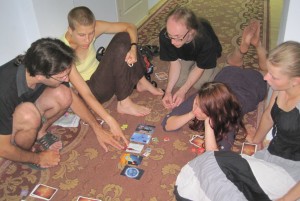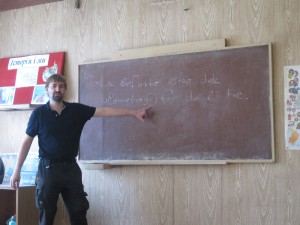First time abroad and at IJK! Posted by Chuck Smith on Aug 2, 2011 in Uncategorized
As a long-time participant of Esperanto youth conferences, you can sometimes get the “Been there, done that” sentiment and it’s always refreshing to have a new voice to remind you of the charm of the first time at such an event. That’s way I’m delighted to have a guest entry about the International Youth Conference of Esperanto (IJK) from Jessica Grasso who recalls her first time.
|
Lastatempe mi ankaŭ vojaĝis al la 67-a IJK en Ukrainio! Ĉi tiu vojaĝo estis por mi multaj “unuaj”: mia unua esperanta evento, mia unua vojaĝo en Eŭropo, kaj mia unua sperto viziti lokon, kie homoj ne plejparte parolas la anglan. Entute estis mirinda sperto, kaj mi nepre revenos al Esperantujo kiam mi denove havas la tempon kaj monon.
La vivkondiĉoj ne estis luksaj, sed por mi tute sufiĉis, kaj memorigis min iom pri universitataj loĝejoj (sed pli malmultekostaj!). Krom la loĝejo estis restoracio kaj lernejo, kiujn ni ofte uzis dum la kongreso. La restoraciaj manĝaĵoj estis sufiĉe bonaj, kvankam kelkfoje malfruaj, kaj la (vegetaraj) pladoj plejparte plaĉis al mi. En la lernejo okazis diversaj programoj, koncertoj, libroservo, ktp., dum la semajno, kaj ekstere estis lokoj por marŝi, sportumi, kaj tendumi. Mi vojaĝis al la urbo frue, kelkaj tagoj antaŭ la kongreso komenciĝis, kiu certe estis bona ideo. Iu trovis min ĉe la flughaveno, renkontis aliajn partoprenantojn, kaj poste montris al ni la urbon. Neniam mankis al mi interesaj spertoj, eĉ antaŭe. Kelkaj afablaj, helpemaj lokuloj ĉiĉeronis nin tra Kievo: al la urbocentro, parkoj, vendejoj, manĝejoj, ktp. Ni povis vidi kaj gravajn, konatajn partojn de la ĉefurbo, kaj viziti aŭ lerni pri pli kutimaj, ĉiutagaj lokoj. Ŝajnis ke ni estis kvazaŭ gastoj, anstataŭ turistoj, kaj tiun sperton mi ĝojegis! |
Recently, I also traveled to the 67th annual IJK in Ukraine! This trip was many “firsts” for me: my first Esperanto event, my first trip in Europe, and my first experience visiting a place where people mostly weren’t speaking English. Overall it was a wonderful experience, and I will certainly return to Esperantujo again when I have the time and money.
The living conditions weren’t luxurious, but for me were entirely sufficient, and reminded me of college dorms (but cheaper!). Aside from the hostel there was a restaurant and school, which we often used during the congress. The restaurant food was sufficiently good, although sometimes late, and for the most part I liked the (vegetarian) dishes. In the school there were various programs, concerts, a book store, etc., during the week, and outside were places for walking, sports, and camping. I traveled to the city early, several days before the congress began, which was definitely a good idea. Someone got me from the airport, met another participant, and afterward showed us the city. We were never lacking interesting things to do, even beforehand. Several nice, helpful locals guided us through Kiev: to the city center, parks, stores, restaurants, etc. We could see both important, well-known parts of the capital city and visit or learn about more usual, everyday places. It seemed like we were guests instead of tourists, and I really enjoyed that experience. |
|
Dum la kongreso mem, ĉiam estis io por fari. Matene okazis diversaj kursoj kaj prelegoj pri kaj esperanto kaj aliaj temoj. Inter aliaj, mi partoprenis esperantan kurson meznivelan, kiu estis kaj utila kaj amuza. Tagmeze oni povis sportumi, ripozi, babili kaj amikumi. Estis sporta tago, lingva tago, ukrainia tago, kaj aliaj. Vespere estis koncertoj, dancado, festado, kaj diversaj ludoj. Vere estis evento por ĉiuj. Mi, persone, provis fari ĉion, kaj, malsaĝe, apenaŭ dormis dum la semajno.
Iom rimarkis mi, ke estis problemoj pri organizado de la evento, sed oni povas kaj devas esti fleksebla anstataŭ kritikema. Kelkfoje, ekzemple, mi provis partopreni klason aŭ prelegon, sed la loko aŭ tempo skribita sur la horaro estis malĝusta, kaj la detaloj pri eventoj ofte estis malklaraj. Kiam okazis, tamen, mi ĉiam trovis alian agadon por partopreni. Ekzemple, mi lernis brazilan dancon kaj partoprenis teatraĵeton pro maltrafo de alia planita okazaĵo. Mi ne povas multe diri pri IJKoj ĝenerale, ĉar ĉi tiu kongreso estis mia unua. Plue, preskaŭ ĉio estis interesa kaj nova laŭ mi, tial mi volis fari ĈION, kiu evidente ne eblas. Neniam antaŭe mi partoprenis eventon, kie la unuaj du demandoj, kiujn homoj demandis, estis “Kiel vi nomiĝas?” kaj “El kiu lando vi venas?” Mi ekkonis multajn interesajn homojn, kaj sentis min tre triste forirante. Estis bonega sperto, kaj mi nun komprenas, kial ekzistas tiom da esperantlingvaj kantoj pri malĝojaj adiaŭadoj! |
During the congress itself, there was always something to do. In the morning were various classes and talks about both Esperanto and other topics. Among others, I participated in a mid-level Esperanto course, which was both useful and fun. In the afternoon, one could play sports, relax, chat, and hang out. There was a sports day, a language day, a Ukrainian day, and others. In the evenings were concerts, dancing, partying, and various games. There truly was an event for everyone. I personally tried to do everything, and, unwisely, hardly slept during the week.
I noticed somewhat that there were problems with organizing the event, but one can and must be flexible instead of critical. Several times, for example, I tried to attend a class or lecture, but the location or time written on the schedule was incorrect, and the details about events were often unclear. When this happened, however, I always found another activity to participate in. For example, I learned a Brazilian dance and participated in a skit because I missed another planned activity. I can’t say much about IJKs in general, because this congress was my first. Furthermore, almost everything was interesting and new to me, and therefore I wanted to do EVERYTHING, which obviously isn’t possible. I have never before attended an event where the first two questions that people asked were “What is your name?” and “What country are you from?” I met many interesting people, and felt very sad upon leaving. It was an excellent experience, and I now understand why there are so many songs in Esperanto about depressing goodbyes! |

Build vocabulary, practice pronunciation, and more with Transparent Language Online. Available anytime, anywhere, on any device.
About the Author: Chuck Smith
I was born in the US, but Esperanto has led me all over the world. I started teaching myself Esperanto on a whim in 2001, not knowing how it would change my life. The timing couldn’t have been better; around that same time I discovered Wikipedia in it’s very early stages and launched the Esperanto version. When I decided to backpack through Europe, I found Esperanto speakers to host me. These connections led me to the Esperanto Youth Organization in Rotterdam, where I worked for a year, using Esperanto as my primary language. Though in recent years I’ve moved on to other endeavors like iOS development, I remain deeply engrained in the Esperanto community, and love keeping you informed of the latest news. The best thing that came from learning Esperanto has been the opportunity to connect with fellow speakers around the globe, so feel free to join in the conversation with a comment! I am now the founder and CTO of the social app Amikumu.





